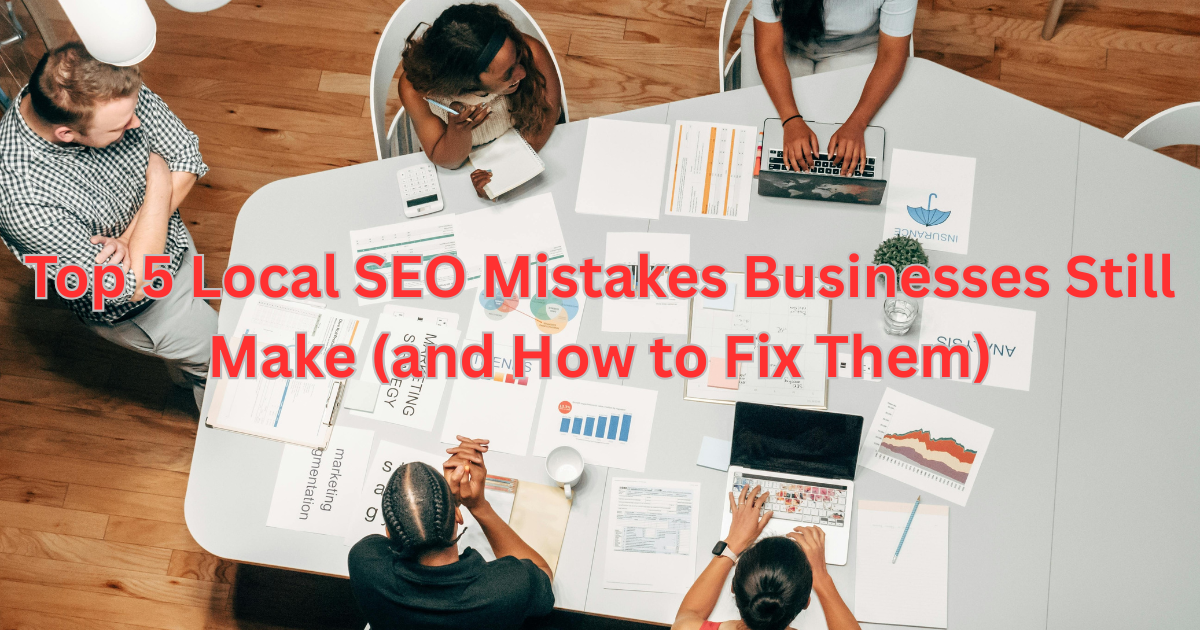Notifications

9 minutes, 30 seconds
-25 Views 0 Comments 0 Likes 0 Reviews

In today's competitive digital landscape, local SEO has become a critical component for businesses aiming to gain visibility in their local market. Whether you're a digital marketing agency, a small business owner, or an e-commerce SEO expert, you need to ensure that your website is optimized for local search queries. However, many businesses still make common local SEO mistakes that hinder their visibility and growth. In this article, we'll highlight the top 5 local SEO mistakes businesses still make—and more importantly, show you how to fix them.
One of the biggest local SEO mistakes businesses make is neglecting their Google My Business (GMB) profile. GMB is an essential tool that helps businesses appear in Google Search and Maps when local users search for relevant services. However, many businesses either leave their GMB profile incomplete or fail to update it regularly, which can negatively affect their local rankings.
To fix this, ensure your Google My Business profile is fully optimized. This includes providing accurate business details like your name, address, phone number (NAP), website URL, business hours, and category. Be sure to add high-quality images, respond to customer reviews, and update your profile regularly with posts and offers. If you're unsure how to manage your GMB profile, hiring a digital marketing agency or SEO freelancer can help streamline the process.
Many businesses focus heavily on broad keywords but fail to incorporate local keywords into their content. Local searchers often include location-based terms when looking for services, like "SEO services for small businesses in [City]" or "E-commerce marketing consultant in [City]." Without targeting these terms, businesses miss out on attracting potential customers in their local area.
To address this mistake, be strategic about using local keywords on your website. Research the most relevant local search terms using tools like Google Keyword Planner or SEMrush, and integrate them naturally into your content. For example, if you’re an E-commerce marketing specialist, include keywords such as “best e-commerce marketing services in [City]” or “affordable E-commerce SEO expert for local businesses.”
Using SEO services for small businesses or other location-based phrases throughout your site can help increase visibility for local searches and drive more traffic to your website.
With an increasing number of users accessing the web on their smartphones, having a mobile-friendly website is no longer optional—it's essential. Businesses that fail to optimize their website for mobile devices risk losing valuable traffic, as search engines like Google prioritize mobile-friendly sites in local search results.
To fix this mistake, ensure your website has a responsive design that adapts to various screen sizes. Test your website using Google's Mobile-Friendly Test tool, and make adjustments to improve speed, navigation, and content display on mobile devices. If you're unsure how to optimize your website, consider reaching out to an SEO consultant or a company offering custom web development solutions for expert advice.
Customer reviews play a significant role in local SEO. When potential customers see positive feedback about your business, it increases trust and credibility, leading to higher conversion rates. However, many businesses fail to actively manage their reviews, leaving negative feedback unaddressed or failing to solicit new reviews.
To improve your reputation and local SEO performance, actively manage your reviews on platforms like Google, Yelp, and Facebook. Encourage satisfied customers to leave positive reviews, and respond to negative reviews promptly and professionally. Addressing customer concerns in a timely and respectful manner shows your commitment to excellent customer service, which can improve your rankings.
Additionally, working with an SEO freelancer or an Expert SEO Agency can help you create a comprehensive review management strategy to ensure consistent positive feedback across various platforms.
Inconsistent or incorrect NAP information across the web can confuse search engines and potential customers. If your business’s name, address, or phone number is listed differently on various platforms, search engines might not recognize your business as authoritative or trustworthy, which can hurt your local SEO rankings.
To fix this, audit all your business listings across various online directories, review sites, and social media platforms to ensure your NAP information is consistent. Tools like Moz Local or Yext can help you track and manage your business listings across multiple sites. Keeping your information consistent will improve your visibility and help local searchers find you more easily.
If you're unsure how to manage your listings, an E-commerce marketing consultant or SEO services for small businesses can help ensure that your online presence is up-to-date and consistent.
Local SEO is a powerful way for businesses to attract customers in their local area, but it requires careful attention to detail for career opportunity . By avoiding these common local SEO mistakes and implementing the fixes outlined in this article, you can significantly improve your business's local online presence. Whether you’re working with an SEO analyst, an E-commerce SEO expert, or managing your SEO efforts in-house, the key is consistency and optimization.
If you're looking to take your local SEO strategy to the next level, consider partnering with an experienced digital marketing agency and Latest Technology Tips to drive better results. Remember, local SEO is an ongoing process, so continuous monitoring and adjustments are essential to stay ahead of the competition.
You can still optimize your Google My Business profile, engage with local customers on social media, and claim your listings on local directories to boost visibility.
Reviews are a key factor in local SEO because they build trust, enhance your business’s credibility, and influence search rankings.
While some aspects of local SEO can be managed by yourself, hiring an SEO consultant or digital marketing agency can ensure a more effective and comprehensive approach.
Some of the Best SEO Tools for local optimization include Moz Local, SEMrush, and Google Analytics for tracking performance and local keyword rankings.
It's important to keep your GMB profile updated regularly with current business hours, special offers, and recent photos to stay competitive.
How have you optimized your business for local SEO? Share your thoughts and experiences in the comments!

